
This layout plays an enormous role in Elite's immersion factor, lending a sense of scale when you're travelling and exploring, and a terrifying feeling of vulnerability during combat. Equally important is the sound of your ship. Thrusters roar into live, causing the entire craft to shudder slightly around you. The ship's robotically-voiced computer casually issues observations about you're ship's status and warnings regarding hazards. It could be you've forgotten to deploy your landing gear when docking, it could be you're about to crash into a star. Perhaps best of all is the anticipation built by the slow crescendo of your charging "Frameshift" drive, and then the delicious payoff as it "whumps" you across five, ten, twenty light-years of space.
Whether audible or visual, every little detail Frontier have painstakingly added increases that sensation of your ship as a 3D object that exists around you, a tiny mobile sanctuary in the harshest wilderness of them all. It's bizarre that a game this big relies so heavily on the representation of such a tiny space, but there's no question that Frontier's work here a vital contributor to the game's overall quality. This groundwork ensures that every action you perform in Elite feels good under the fingers, whether you're swooping through a star system, docking at a space station, or engaged in a dogfight.
While Elite is palpably engaging in virtually every instance, combat is undoubtedly where you feel closest to your ship. This is because it's where you're most active in the cockpit, and also where you're most likely to lose it. You don't need to become an expert fighter to progress in Elite, but I'd say it's worth mastering because it is enormous fun. Learning how to keep a target in view in 3D space, how to simultaneously control your speed, manoeuvrability, and power distribution for maximum effectiveness, and which weapons are best suited to specific enemies and purposes, there's real skill involved in become a proficient fighter pilot. The only disappointment is the lack of truly massive ships knocking around space. The Anaconda is a fearsome vessel, but the largest ships in the game, the Capships, are AI only, and you'll rarely see one doing much more than orbiting a major planet. When it comes to interstellar fisticuffs, Elite takes its cues far more from the Air Force than the Navy.
Yet all the potential routes to that hallowed 'Elite' status require you to learn the ins and outs of your chosen vocation, whether it's taking advantage of the trading network or improving your reputation among the galaxy's many factions. There are varying ways to approach these activities as well. You can do them freeform, such as exploiting trade routes and price variations to make a profit from goods which you buy and sell yourself, or you can accept missions from the bulletin boards located at space stations, that may request delivery of a consignment of goods, or ask you to fetch specific items for which they'll pay a higher rate. Completing missions in a specific area of space will earn you greater respect from the three major factions; Federation, Empire, and Alliance, and eventually unlock new missions that provide the opportunity to increase in rank.
Like the 1984 original, Elite Dangerous makes heavy use of random generation. Missions are one example, but throughout the game you'll come across "unidentified signal sources". Exploring these will trigger certain events that range from wrecked ships with valuable cargo floating amid the pieces, to titanic battles between pirates and security forces. Because I've been playing Elite on and off for almost six months now, it's difficult to estimate how long these will keep players interested. On the one hand, there's a fair amount of repetition evident (there are a lot of funeral convoys cruising around the galaxy). On the other, Elite's fundamental systems are such that events like dogfights are fun no matter how many times you fall into one.
What's more, more unique missions are unlocked as you progress in rank, and your approach to the game will be affected greatly by how you kit out your ship. Equipping a Frameshift drive Interdictor will allow you to pull other ships out of "SuperCruise", which is used for travelling inside star systems. So if you're hunting pirates, you won't need to rely on random encounters. But this may come at the cost of your Shield Generator or several other highly useful tools.
Whether audible or visual, every little detail Frontier have painstakingly added increases that sensation of your ship as a 3D object that exists around you, a tiny mobile sanctuary in the harshest wilderness of them all. It's bizarre that a game this big relies so heavily on the representation of such a tiny space, but there's no question that Frontier's work here a vital contributor to the game's overall quality. This groundwork ensures that every action you perform in Elite feels good under the fingers, whether you're swooping through a star system, docking at a space station, or engaged in a dogfight.
While Elite is palpably engaging in virtually every instance, combat is undoubtedly where you feel closest to your ship. This is because it's where you're most active in the cockpit, and also where you're most likely to lose it. You don't need to become an expert fighter to progress in Elite, but I'd say it's worth mastering because it is enormous fun. Learning how to keep a target in view in 3D space, how to simultaneously control your speed, manoeuvrability, and power distribution for maximum effectiveness, and which weapons are best suited to specific enemies and purposes, there's real skill involved in become a proficient fighter pilot. The only disappointment is the lack of truly massive ships knocking around space. The Anaconda is a fearsome vessel, but the largest ships in the game, the Capships, are AI only, and you'll rarely see one doing much more than orbiting a major planet. When it comes to interstellar fisticuffs, Elite takes its cues far more from the Air Force than the Navy.
Yet all the potential routes to that hallowed 'Elite' status require you to learn the ins and outs of your chosen vocation, whether it's taking advantage of the trading network or improving your reputation among the galaxy's many factions. There are varying ways to approach these activities as well. You can do them freeform, such as exploiting trade routes and price variations to make a profit from goods which you buy and sell yourself, or you can accept missions from the bulletin boards located at space stations, that may request delivery of a consignment of goods, or ask you to fetch specific items for which they'll pay a higher rate. Completing missions in a specific area of space will earn you greater respect from the three major factions; Federation, Empire, and Alliance, and eventually unlock new missions that provide the opportunity to increase in rank.
Like the 1984 original, Elite Dangerous makes heavy use of random generation. Missions are one example, but throughout the game you'll come across "unidentified signal sources". Exploring these will trigger certain events that range from wrecked ships with valuable cargo floating amid the pieces, to titanic battles between pirates and security forces. Because I've been playing Elite on and off for almost six months now, it's difficult to estimate how long these will keep players interested. On the one hand, there's a fair amount of repetition evident (there are a lot of funeral convoys cruising around the galaxy). On the other, Elite's fundamental systems are such that events like dogfights are fun no matter how many times you fall into one.
What's more, more unique missions are unlocked as you progress in rank, and your approach to the game will be affected greatly by how you kit out your ship. Equipping a Frameshift drive Interdictor will allow you to pull other ships out of "SuperCruise", which is used for travelling inside star systems. So if you're hunting pirates, you won't need to rely on random encounters. But this may come at the cost of your Shield Generator or several other highly useful tools.

MSI MPG Velox 100R Chassis Review
October 14 2021 | 15:04

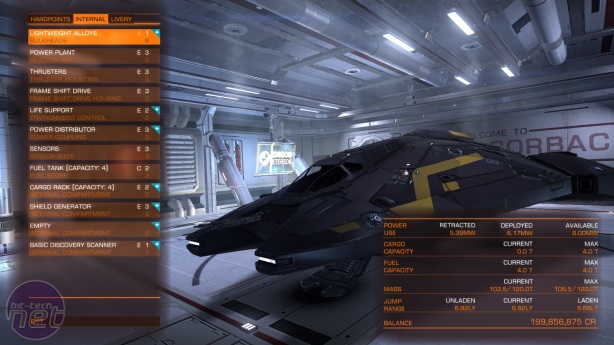
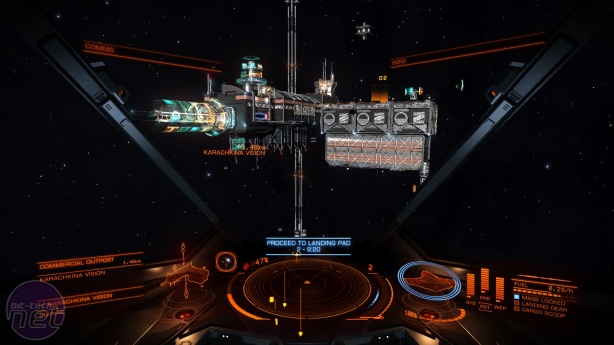
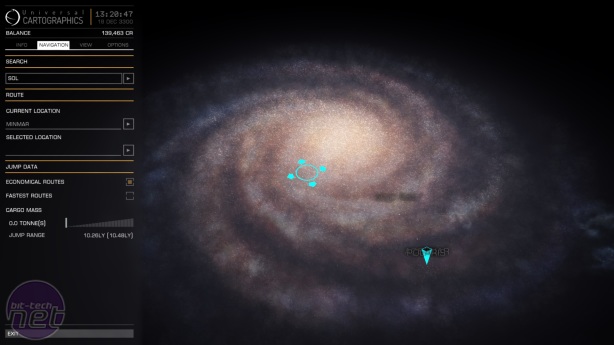
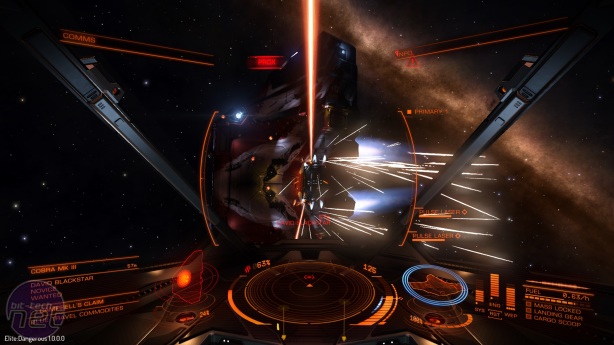
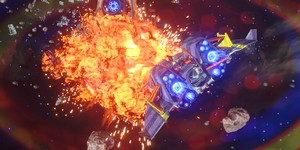
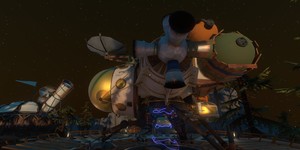






Want to comment? Please log in.